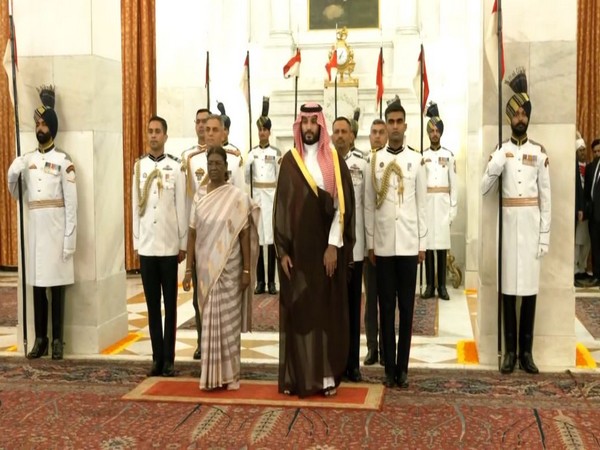President Droupadi Murmu and Saudi Arabia Crown Prince and Prime Minister Mohammed bin Salman Al Saud on Monday met at Rashtrapati Bhavan in New Delhi.
Vice President Jagdeep Dhankhar, Prime Minister Narendra Modi, NSA Ajit Doval, Union Ministers and other delegates from Saudi Arabia were also present at the gathering which was addressed by President Murmu and the Saudi Crown Prince Mohammed bin Salman Al Saud.
President Murmu said: “I have faith that your (Crown Prince and PM of Saudi Arabia, Prince Mohammed bin Salman bin Abdulaziz Al Saud) meeting with PM Modi on strategic partnership and your participation in G20 summit have strengthened the ties between two countries further…”
The President further said: “While discussing with you (Saudi Crown Prince) today, I am happy to note that over the years our bilateral partnership has expanded significantly in all areas ranging from politics, defence, security, trade and investment, energy, culture and people-to-people ties.”
“Saudi Arabia has accepted a large number of immigrants from India and given them an opportunity to flourish,” she said.
Meanwhile, the Saudi Crown Prince extended his gratitude to India for the warm welcome and hospitality during his visit to India. “We the Kingdom of Saudi Arabia value the historical relationship between the two countries, and we look forward to deepening cooperation in all areas,” he said.
The Saudi Crown Prince on Saturday arrived in Delhi on a three-day visit and stayed back after the G20 Summit for his state visit. The Saudi Arabia Crown Prince and PM Modi on Monday held a bilateral meeting in New Delhi.
External Affairs Minister S Jaishankar, National Security Advisor Ajit Doval and others were present in the meeting.
Prior to his meeting with PM Modi, the Saudi Arabian Crown Prince received a ceremonial reception at Rashtrapati Bhavan PM Modi and President Droupadi Murmu welcomed the Saudi Arabian Crown Prince at Rashtrapati Bhavan.
The Saudi Crown Prince then inspected a combined defence services Guard of Honour. In a brief statement, Mohammed bin Salman congratulated India for a successful G20 presidency.
Speaking to reporters, he said, “Well done India, a lot of announcements made that will benefit both our countries, the G20 countries and the whole world. So I want to say to India well done, and we will work to create a future for both countries.”
Meanwhile, India and Saudi Arabia have signed as many as eight agreements during the Saudi Crown Prince’s India visit, said Ministry of External Affairs on Monday.
Addressing a press briefing on the State visit of the Saudi Crown Prince, Secretary (CPV and OIA) Ausaf Sayeed said, “I am happy to share with you that during this visit as many as eight agreements have been signed.”
The agreements signed are in the field of energy, in the field of digitalization and electronic manufacturing, and cooperation between India’s Central Vigilance Commission and Saudi Anti-corruption. There was an agreement between the two investment entities, India and Saudi counterparts Exim banks, Small and Medium Enterprises Banks and an agreement on desalination. An agreement was also signed on renewable energy.
“One is the field of energy which was signed by the Saudi Minister of Energy and our Minister of New and Renewable Energy,” said Sayeed.
“Then there was an agreement between the agreement in the field of digitalisation and electronic manufacturing between the IT ministries of both sides,” he said.
Another agreement was between Central Vigilance Commission of India and its counterpart the Saudi Oversight and Anti-Corruption Authority.
“And the fourth agreement was between the National Archives. Then there was an agreement between the two investment entities, that is Invest India on the Indian side and the Ministry of Investment on Saudi side,” said Sayeed.
“There was another agreement between the two EXIM banks and there was also another agreement between the Small and Medium Enterprises Bank banks of two sides, that is SIDBI and the SME Bank of Saudi Arabia,” the Secretary said, adding, “And the last one was in the field of Desalination.”
Over two dozen Memoranda of Understanding were signed between India and Saudi Arabia companies, ranging from Information Technology, agriculture, pharmaceuticals, petrochemicals, and human resources, among other sectors. (ANI)
Read More: http://13.232.95.176/
